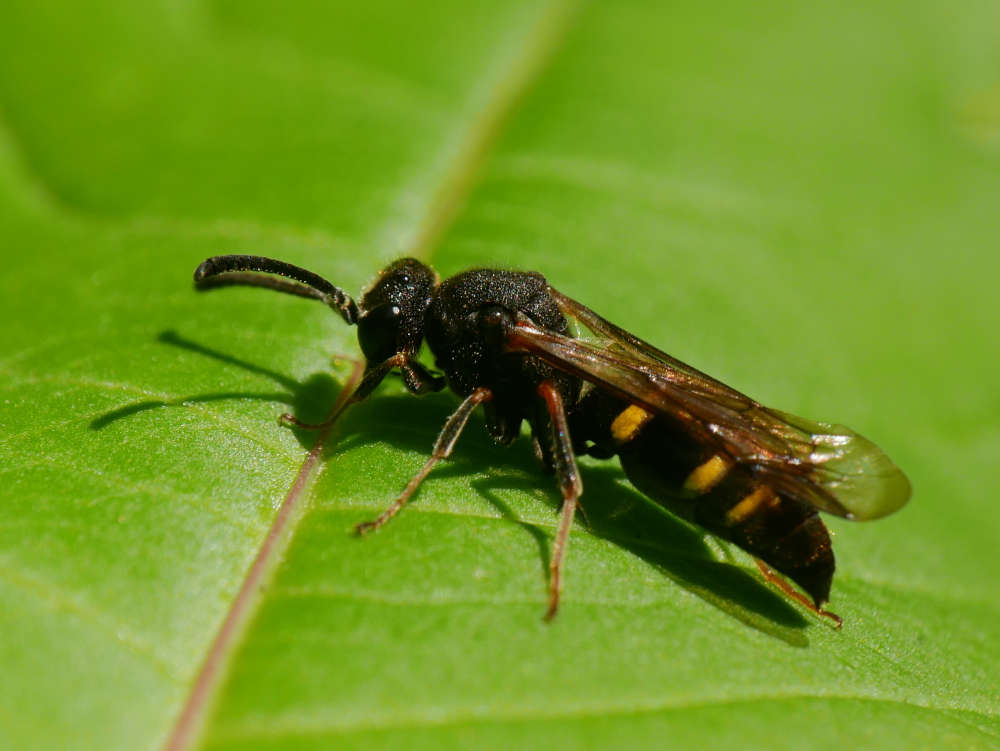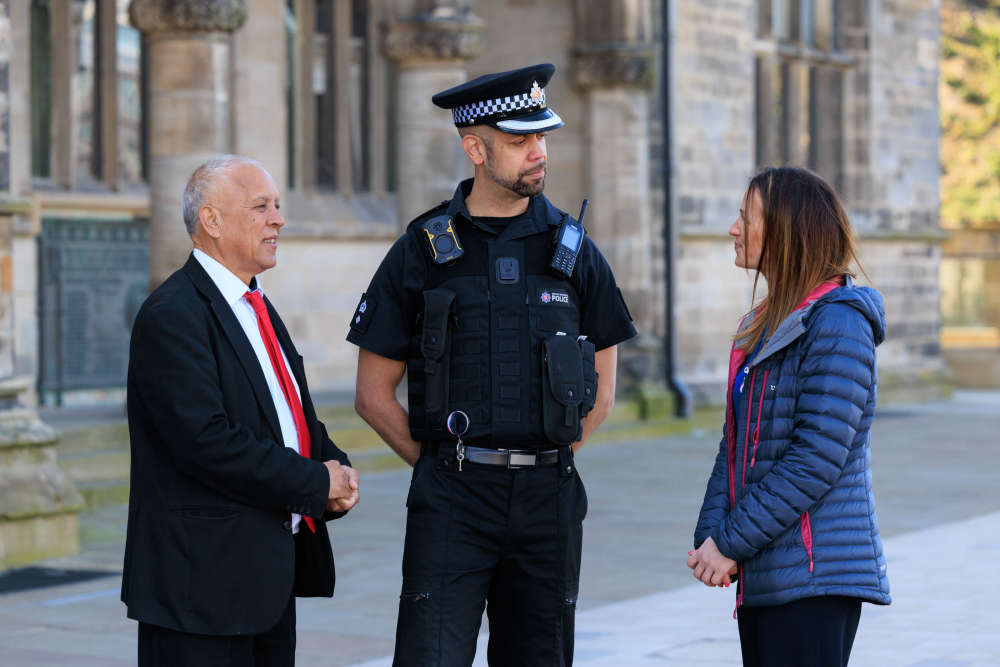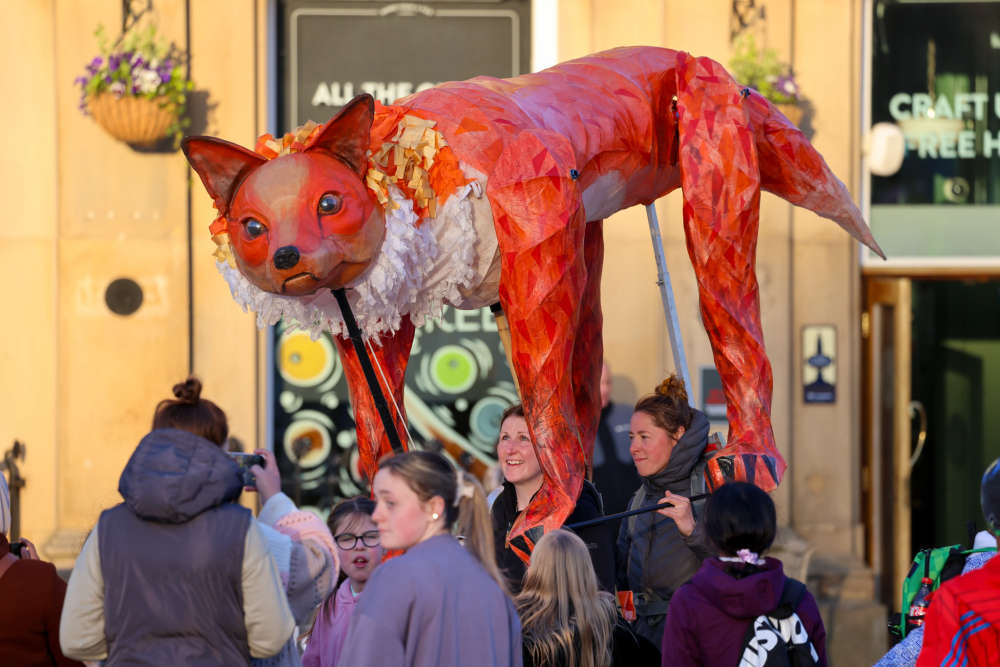
A new species of parasitic wasp has been recorded for the first time in Greater Manchester as part of a project funded by the Government’s Green Recovery Challenge Fund.
The large-spurred digger wasp, Nysson spinosus, is a parasite of other digger wasp species and has a fascinating lifecycle. This is a hugely exciting discovery as this elusive species has not previously been seen in Greater Manchester, despite the potential for wider distribution in the area.
The wasp was spotted by Lancashire Wildlife Trust volunteer, Joe Holt, during a guided wildlife walk through Philips Park, Bury during the summer. The species identification was later confirmed by experts Karen McCartney, BWARS member and recorder/verifier for aculeate Hymenoptera covering Greater Manchester for Greater Manchester Ecology Unit and Greater Manchester Local Records Centre, who was leading the walk and Ben Hargreaves, Lancashire Wildlife Trust Plan Bee Project Officer, Lancashire Recorder for aculeate Hymenoptera and BWARS member.
Karen said: “This wasp is a cleptoparasite of Argogorytes species, most likely Argogorytes mystaceus in this part of the UK. This species isn’t regarded as scarce or threatened but is still a fantastic record for Greater Manchester and can be seen from May to July, particularly in deciduous woodland.”
The large-spurred digger wasp belongs to the Crabronidae family within the Hymenoptera group, which includes ants, bees, wasps and sawflies. This parasitic species seeks out the burrows of other digger wasps by scent, enters the burrow and lays her own egg on the food stored by the host wasp. The larva then hatches, destroys the host wasp’s egg and feeds on the food store originally intended for the larva of the host wasp. This clever tactic saves the large-spurred digger wasp a lot of time and energy as the host wasp digs the burrow and collects all the food needed to sustain the growing wasp.
Despite the slightly sinister way in which this wasp species reproduces, they occupy a valuable place in the ecosystem and are important pollinators. Large-spurred digger wasps are frequently seen on umbellifers like cow parsley, common bird’s foot trefoil and wood spurge. Digger wasps also play a key role in controlling numbers of other invertebrates, their sting is not a defence mechanism, it is used to paralyse their prey.
The UK is lucky enough to be home to several thousand different species of wasp. Some species are solitary, like the large-spurred digger wasp found at Philips Park, while some are social wasps, like the well-known common wasp.
Wasps get a lot of bad press, but they really don’t deserve the enmity directed at them. They provide valuable ecosystems services, such as pest control through predation of other invertebrates and the pollination of flowers and crops.
Insect numbers have plummeted in the last 50 years, and 41% of insects worldwide are thought to face extinction. Declines are mainly attributed to a loss of habitat and the increased use of harmful pesticides. If insect declines are not stopped, the terrestrial and freshwater ecosystems that humans and other wildlife rely on for food and clean drinking water will collapse.
Did you know that in the UK gardens cover a larger area than all of our nature reserves combined? No matter how small your garden, every outdoor space is important in helping to restore insect numbers and everyone can make a difference. Another way to get involved and to learn more about insects is to record your insect finds using the wildlife recording app, iNaturalist.
Feeling inspired by nature and want to get involved? Head to the Lancashire Wildlife Trust events page on our website for future events at Philips Park and in the surrounding area. Philips Park Local Nature Reserve in Prestwich boasts a wide variety of habitats supporting urban wildlife, and is a wonderful place to go on a nature walk to spot new species. And, if you want to do more for wildlife and spend some time out in nature learning new skills with like-minded people, join our volunteer group! Email: gcastro@lancswt.org.uk for more information or register via our website at www.lancswt.org.uk/volunteer
This project is funded by the Government's Green Recovery Challenge Fund, accessed through the Greater Manchester Environment Fund. The fund was developed by Defra and its Arm's-Length Bodies. It is being delivered by The National Lottery Heritage Fund in partnership with Natural England, the Environment Agency and Forestry Commission.


 Bury FC beat Burscough 4-0
Bury FC beat Burscough 4-0
 Paul Waugh MP Welcomes Major Flood Prevention Funding for Rochdale
Paul Waugh MP Welcomes Major Flood Prevention Funding for Rochdale
 Supported housing to help people live independently
Supported housing to help people live independently
 Rochdale's year as Greater Manchester’s cultural hot spot
Rochdale's year as Greater Manchester’s cultural hot spot
 Rochdale education awards return for second year
Rochdale education awards return for second year
 Mayor of Greater Manchester calls for fix to England’s ‘broken’ taxi licensing system
Mayor of Greater Manchester calls for fix to England’s ‘broken’ taxi licensing system
 Police and partner initiative launched in Rochdale town centre to tackle crime and anti-social behaviour
Police and partner initiative launched in Rochdale town centre to tackle crime and anti-social behaviour
 Former Rochdale midfielder Joe Thompson dies aged 36
Former Rochdale midfielder Joe Thompson dies aged 36
 New McDonald’s drive-thru plan officially tabled
New McDonald’s drive-thru plan officially tabled
 Detective Sergeant Dismissed and Banned from Policing following Sexual Assault Conviction
Detective Sergeant Dismissed and Banned from Policing following Sexual Assault Conviction
 Each candidate hoping to win the Balderstone and Kirkholt by-election
Each candidate hoping to win the Balderstone and Kirkholt by-election
 Thousands enjoy spectacular town centre parade
Thousands enjoy spectacular town centre parade


